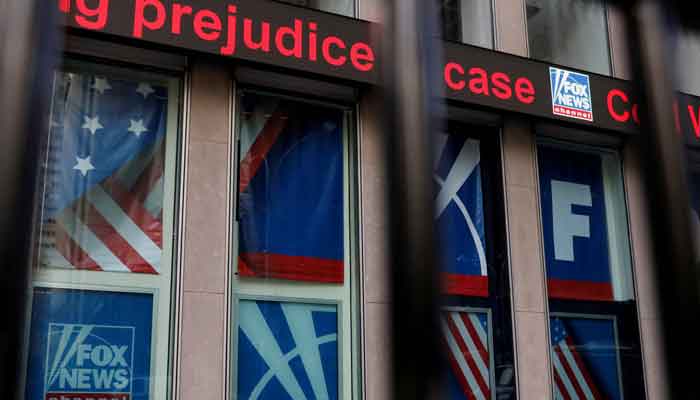[ad_1]

- Dominion CEO calls settlement of 2021 lawsuit ‘historic’.
- Fox says it wanted to avoid ‘acrimony of a divisive trial’.
- Settlement announced at 11th hour, after jury picked.
WILMINGTON: Fox Corp and Fox News on Tuesday settled a defamation lawsuit by Dominion Voting Systems for $787.5 million, averting a trial putting one of the world’s top media companies in the crosshairs over its coverage of false vote-rigging claims in the 2020 US election.
The settlement, which legal experts said was the largest struck by an American media company, was announced by the two sides and the judge in the case at the 11th hour.
The jury had been selected earlier in the day and the trial poised for opening statements in Wilmington, Delaware. Dominion had sought $1.6 billion in damages in the lawsuit filed in 2021.
Dominion CEO John Poulos called the settlement “historic.”
“Fox has admitted to telling lies about Dominion that caused enormous damage to my company, our employees and our customers,” Poulos said in a statement.
“Truthful reporting in the media is essential to our democracy,” Poulos said.
At issue in the lawsuit was whether Fox was liable for airing the false claims that Denver-based Dominion’s ballot-counting machines were used to manipulate the presidential election in favour of Democrat Joe Biden over then-President Donald Trump, a Republican.
Tuesday’s settlement spared Fox the peril of having some of its best-known figures called to the witness stand and subjected to potentially withering questioning, including executives such as Rupert Murdoch, the 92-year-old who serves as Fox Corp chairman, as well as on-air hosts Tucker Carlson, Sean Hannity and Jeanine Pirro.

Fox anchor Neil Cavuto broke into his news show “Your World” about 4:30 pm Eastern Time to report the settlement. A statement by Fox was read on air.
“We are pleased to have reached a settlement of our dispute with Dominion Voting Systems,” the statement said. “We acknowledge the Court’s rulings finding certain claims about Dominion to be false. This settlement reflects FOX’s continued commitment to the highest journalistic standards. We are hopeful that our decision to resolve this dispute with Dominion amicably, instead of the acrimony of a divisive trial, allows the country to move forward from these issues.”
Fox has billions in cash
Shares of Fox Corp closed up slightly at $34 per share, but were down 1% in after-hours trading following disclosure of the settlement amount. Fox has cash on hand to pay for a settlement. It committed $3 billion to buy back shares in the first quarter after revenues beat estimates. Fox Corp CEO Lachlan Murdoch told Wall Street analysts in February that the company had about $4 billion cash on hand.
Dominion lawyers declined to answer questions about whether Fox News would apologise publicly or make changes.
Fox News is the most-watched US cable news network.
The settlement of $787.5 million is the largest amount of money paid to conclude an American media libel case, said Richard Tofel, principal of Gallatin Advisory. The previously highest payment occurred in 2017 when Walt Disney Co paid $177 million, in addition to insurance recoveries, to settle the “pink slime” defamation case against its ABC network by Beef Products Inc.
Dominion sued Fox Corp and Fox News, contending that its business was ruined by the false vote-rigging claims that were aired by the news outlet known for its roster of conservative commentators. The trial was to have tested whether Fox’s coverage crossed the line between ethical journalism and the pursuit of ratings, as Dominion alleged and Fox denied. Fox had portrayed itself in the pretrial skirmishing as a defender of press freedom.
Delaware Superior Court Judge Eric Davis, presiding over the case, had ordered a one-day trial postponement on Monday. Fox was pursuing settlement talks, two sources familiar with the matter said. Davis delayed the trial on Tuesday, as the two sides appeared to hammer out the deal in private.
The primary question for jurors was to be whether Fox knowingly spread false information or recklessly disregarded the truth, the standard of “actual malice” that Dominion must show to prevail in a defamation case.
In February court filings, Dominion cited a trove of internal communications in which Murdoch and other Fox figures privately acknowledged that the vote-rigging claims made about Dominion on-air were false. Dominion said Fox amplified the untrue claims to boost its ratings and prevent its viewers from migrating to other media competitors on the right.
Another lawsuit pending
Adding to the legal risks for Fox, another US voting technology company, Smartmatic, is pursuing its own defamation lawsuit seeking $2.7 billion in damages in a New York state court.
“For many plaintiffs, a court holding, and admission by the defendant about falsity, are even more important than any actual money damages,” said Mary-Rose Papandrea, a constitutional law professor at the University of North Carolina School of Law.
Fox had earlier argued that claims by Trump and his lawyers about the election were inherently newsworthy and protected by the US Constitution’s First Amendment. Davis ruled in March that Fox could not use those arguments as a defense, finding its coverage was false, defamatory and not protected by the First Amendment.
The lawsuit referenced instances in which Trump allies including his former lawyers Rudolph Giuliani and Sidney Powell appeared on Fox News to advance the false allegations.
Murdoch internally described the election-rigging claims as “really crazy” and “damaging” but declined to wield his editorial power to stop them and conceded under oath that some Fox hosts nonetheless “endorsed” the baseless claims, Dominion told the court in a filing.
Under questioning from a Dominion lawyer, Murdoch testified that he thought everything about the election was on the “up-and-up” and doubted the rigging claims from the very beginning, according to Dominion’s filing.
Asked if he could have intervened to stop Giuliani from continuing to spread falsehoods on air, Murdoch responded, “I could have. But I didn’t,” the filing said.
[ad_2]
Source link






